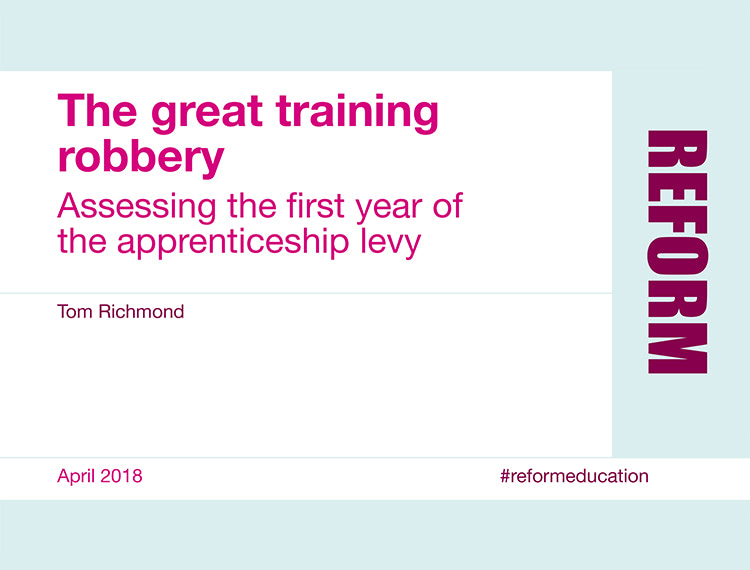£600 million a year could be wasted on poor-quality apprenticeships – Sector Response

Many low-skill and management training courses have been incorrectly labelled as ‘apprenticeships’ to attract millions in government subsidies through the apprenticeship levy, according to a new report from the public services think-tank Reform.
This report, “The Great Training Robbery: assessing the first year of the apprenticeship levy“, shows that these mislabelled courses account for nearly 40 per cent of the apprenticeships designed by employers in recent years. Without reform, in 2019-20 the Government will spend £600 million on courses that are ‘apprenticeships’ in name only.
The report, published as the levy completes its first year of operation, shows that the list of roles now counted as an ‘apprenticeship’ includes serving customers in a delicatessen or coffee shop, working on a hotel reception desk, performing basic office administration and serving food and drink in a restaurant.
Such low-skill and often very short training courses do not meet either the historical or international definition of an apprenticeship, yet they can be delivered as an ‘apprenticeship’ using funds generated by the levy.
The report has also found that employers are using the levy to rebadge existing training courses as apprenticeships.
The motivation is to shift the costs of training onto the Government instead. The most obvious examples of this relabelling are found in leadership and management skills. The list of the most popular apprenticeship standards includes becoming a ‘Team Leader’, ‘Supervisor’ or ‘Manager’.
Cranfield University’s prestigious School of Management has even re-designated its existing Executive MBA as an apprenticeship to attract a 90 per cent government subsidy towards the programme costs.
Such practices demonstrate that ‘apprenticeships’ are increasingly focused on training older and more experienced workers at the expense of creating new opportunities for young people.
The report recommends that a new internationally-benchmarked definition of an apprenticeship is introduced to prevent the possible misuse of the apprenticeship brand by employers and training providers who wish to access government subsidies. Any apprenticeship that is not able to meet this definition should be withdrawn immediately.
In addition, the report proposes that the Government’s target of having 3 million people start an apprenticeship by 2020 is abandoned as it prioritises the quantity of apprenticeships being delivered rather than the need to increase their quality.
The report also makes a number of recommendations aimed at reducing the burdens on employers created by the apprenticeship levy, including a new ‘apprenticeship voucher’ model for employers to control the available government funding as well as removing the requirement for 10 per cent co-investment from employers towards the cost of training apprentices.
 Tom Richmond, Senior Research Fellow at Reform, said:
Tom Richmond, Senior Research Fellow at Reform, said:
“At present, the apprenticeship levy is too complicated for employers, focused on too many inappropriate forms of training and as a result is unlikely to deliver value-for-money. The Government urgently needs to get rid of these poor-quality apprenticeships in order to provide more opportunities for young people to train as genuine apprentices while saving hundreds of millions of pounds in the process.”
 Petra Wilton, director of strategy for the Chartered Management Institute, said:
Petra Wilton, director of strategy for the Chartered Management Institute, said:
“The Reform report fails to mention the huge successes and transformational effects the new breed of apprenticeships are already having on how thousands of employers are now building skilled workforces. Today’s management apprenticeships in particular represent a step-change, rapidly challenging perceptions of low quality to setting the gold standard for vocational learning. Such apprenticeships meet the government’s objectives for helping people of all backgrounds set out in a professional career, as well as addressing UK plc’s chronic skills and productivity gap.
“More than 1,500 people have started a Chartered Manager Degree Apprenticeship – over half are women, half are under the age of 30, and 47% are from economically deprived regions. UK plc needs more and more of these professional managers. According to the latest ONS data, quality of management has a huge impact on productivity. As we face up to the challenges and opportunities of Brexit we need far more support for employers to access the Apprenticeship Levy to invest in developing the next generation of managers with the world-class skills we need to compete internationally.”
 Simon Ashworth, Chief Policy Officer, AELP said:
Simon Ashworth, Chief Policy Officer, AELP said:
“We agree that co-investment should be waived immediately for SMEs wanting to employ young apprentices aged 16-24, because this would help the economy and reverse the negative impact on social mobility that the reforms have had in the levy’s first year.
“Just because there has been a historical definition of a programme, it is a very purist view that says that it cannot change. After all, the economy and the type of jobs market which our children are looking at is changing dramatically, so AELP believes that apprenticeships should be for all ages, all levels and all sectors.
“There’s a real need for social mobility and skills is at level 2 and 3 across a whole range of sectors, e.g. hospitality and care homes, especially with Brexit and less dependence on migrant labour – but they are poorly funded and are apparently considered unimportant.
“Significant enhancement of knowledge skills and behaviour occurs at level 2 and 3 it’s elitist nonsense to suggest otherwise – and this is vital for the engine room of UK plc. 50% of young people come out of school without full level 2 with maths and English. Are we just going to ignore them and their chance of a future career path?
“The roll-out of standards has been an issue but the government has ordered a speeding up of the process. However there are still sectors where standards aren’t in place and the frameworks are now poorly funded. This will either leave gaps in provision or impact on the quality of delivery.
“On quality, Ofsted inspect every apprenticeship. The Chief Inspector said last month that between September 2017 and February 2018, Ofsted made a judgement on the apprenticeship provision at 55 providers and 33,000 apprentices at all levels were in good or outstanding provision – almost 80% of the overall places. Ofqual should be given responsibility for quality assuring the assessment of all apprentices as an extra safeguard.
“A quality apprenticeship should be defined as an effective tripartite partnership between the apprentice, the provider and the employer. The apprentice’s individual skills should be clearly identified at the start, followed by an effective and structured programme of learning to ensure the development of new skills, knowledge and behaviours which are delivered on a timely basis. Valuable and significant progress can be achieved across most sectors at level 2 as much as at level 7, and indeed the marginal benefit at level 2 is often substantially greater than that at higher levels.
“The legal definition of an apprenticeship and the common ingredients of all standards should ensure that the acquiring of new skills and competence is part of any programme with the right quality assurance framework in place. Both Ofsted and Ofqual have a key role to play in deciding whether a quality learning experience is being delivered and then the market in the form of employers will use their judgements to decide how they want to spend their own money.”
 Stephen Evans, Chief Executive of Learning & Work Institute comments:
Stephen Evans, Chief Executive of Learning & Work Institute comments:
“For me, the Levy is a welcome reform. But we have consistently highlighted the risks around unequal access and inconsistent quality that Reform’s report set out. Like Reform, we’ve argued that employer sign off for standards should be underpinned by an international quality benchmark – a two tick system. It’s also clear that we need to do more to ensure fair access to apprenticeships, including for young people.
“And the report is correct that apprenticeships aren’t everything – we’ve consistently argued for other forms of learning and workforce development too. The challenge is to develop these routes, rather than cutting off current routes to progression without anything else in place.
“This is always the risk with targets. They focus effort, but risk distorting behaviours. We need a different approach to targets and outcome measures in the future, and Reform’s report is a welcome contribution to that debate. The Levy is a step forward, it’s time to take the next step”.
 David Hughes, Chief Executive of the Association of Colleges (AoC), said: “The Reform report is a useful contribution to the debate we need about the state of the apprenticeship system. The changes which have been made in the last year have been profound and it is important that we take to time to understand and appreciate what has happened before making further changes. This report has some interesting ideas which should be considered and there have been many other contributions in recent months which are also worthy of debate.
David Hughes, Chief Executive of the Association of Colleges (AoC), said: “The Reform report is a useful contribution to the debate we need about the state of the apprenticeship system. The changes which have been made in the last year have been profound and it is important that we take to time to understand and appreciate what has happened before making further changes. This report has some interesting ideas which should be considered and there have been many other contributions in recent months which are also worthy of debate.
“The expected shortfall in levy spending in the first year will inevitably continue into the second year. That gives some funding for the Government to make investments where things are not working so well. We hope that they take that opportunity and work with employers, colleges, training providers and others to build the programme in terms of quality, access and outcomes.”
A Department for Education spokesperson said:
“We want to see people of all ages and backgrounds getting the excellent training they need to succeed in a wide range of jobs, and we are changing the apprenticeship system to do just that.
“Our reforms have fundamentally changed what apprenticeships are, as we made it a requirement that all apprenticeships must be real paid jobs lasting for a minimum of 12 months, with at least 20 per cent off the job-training. Quality is at the heart of our reforms, and the apprenticeship levy is an important part of that – creating sustainable investment in skills training.
“We’re pleased to see an increase in people starting our new, higher-quality apprenticeship standards in a whole range of industries from nuclear to fashion, law, banking and defence. These apprenticeships are designed by employers themselves, to give people and businesses the skills they really need.”
About Reform: An independent, non-party, charitable think tank whose mission is to set out a better way to deliver public services and economic prosperity.

Responses